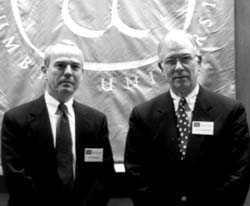Christoph Wolff on Johann Sebastian Bach: The Learned Musician
Even Bach had to pay his dues early in his career.
Although he called himself a court musician, Johann Sebastian Bach was listed as "Lackey Bach" on official documents in 1702, the year before his career took off. In addition to being a musician, as a lackey he also had non-musical duties. Bach concealed his lackey status in later years, said Christoph Wolff, William Powell Mason Professor of Music at Harvard University.
"Launching a professional career is an important event in anyone's life," said Wolff, who spoke about his book, Johann Sebastian Bach - The Learned Musician, at the last TC BookTalk on March 27. "That's why I chose to focus more on this part of Bach's life in the book." His book is a biography offering a portrait of Bach the man, as well as Bach the cultural icon.
Before Wolff's presentation, TC doctoral students played two works representative of Bach's music. Professor Ruth Vinz, Chair of Arts and Humanities Department, read a fugue poem.
Professor of Music Education Harold F. Abeles introduced Wolff by quoting some of the glowing reviews that the book received. He also told how Wolff, born in Germany, studied organ and historical keyboard instruments, musicology and art history at the Universities of Berlin, Erlangen and Freiburg. Wolff noted that a lack of documentation and notes on Bach's life made writing this book a challenge. "I didn't make things up," he said with a distinct German accent, "but I had to infer things from different documents."
Since Bach lived a relatively unexciting life, it was difficult to find events that provided pointed highlights. Also, although it is known that he had a private secretary most of the time, Bach's life wasn't documented well. Few of his letters or notes have survived.
Although the composer was invited to write a biographical essay for a collection that was written while he was alive, he declined to write it. Wolff said that it may be because writing music was more important.
Abeles pointed out in his remarks that Bach was an important teacher, which Wolff amended by describing Bach as one of the most prolific teachers of any musicians in the 18th century. He had over 100 known students, but there could be more.
"Teaching was one of Bach's principle activities for the last 27 years of his life," said Wolff. "He was a composer and performer on the side."
Using the piano that was on the stage, Wolff demonstrated how Bach would teach his students. He said Bach wanted his students "to perform in a singing style and trained his students' hands to work independently so that polyphonic texture comes to the forefront."
Though few of Bach's letters have survived, Wolff said that many receipts, reports, recommendations, and citations were available but not enough to illustrate everyday life. Through these writings, Wolff was able to figure out Bach's teaching method.
The only well-documented part of Bach's life was during the 1730s to 1740s when the composer's nephew was his private secretary and tutor for his children. These documents have survived because his nephew took the books with him and preserved them when he left Leipzeig, Germany. Evidence that Bach kept copies of his letters exists in later documents, but the letters have not been found.
Wolff referred to two other biographical pieces: a notice of Bach's death in the mid-1700s and a biography published in 1802. The biography contained correspondence and reports from Bach's older sons who were still alive at that time.
One audience member asked about Bach's later years. Wolff responded that he found a manuscript in Kiev-in Bach's own hand-that is the last known sample of his handwriting. This piece was a significant find and was incorporated into the book at the last minute before publication.
He also found dictated letters with Bach's signature on them. These letters were different than other samples of Bach's handwriting. They were written after he suffered from a stroke and fever. At this point he was no longer writing documents or music. His signature on the letter showed "heavy leaning on the quill and lettering." Bach died soon after his stroke in 1750.
For more information on BookTalks, please call x3215.
Published Tuesday, Sep. 18, 2001
